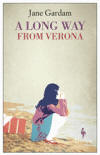A Long Way from Verona
To read a Jane Gardam novel is to be sorry when it ends. In this country she is best known for her non-chronological Old Filth trilogy: Old Filth, The Man in the Wooden Hat, and Final Friends. But this early (originally published in 1971), seemingly autobiographical novel, A Long Way from Verona, has the same Dickensian, odd, well-defined characters. Her wit comes through as usual, in spite of the sometimes obscure British references.
To read a Jane Gardam novel is to be sorry when it ends. In this country she is best known for her non-chronological Old Filth trilogy: Old Filth, The Man in the Wooden Hat, and Final Friends. But this early (originally published in 1971), seemingly autobiographical novel, A Long Way from Verona, has the same Dickensian, odd, well-defined characters. Her wit comes through as usual, in spite of the sometimes obscure British references.
This novel follows Jessica Vye from ages 9 to 13, during the war in a small seaside town called Cleveland Sands, as she begins recognizing herself as a writer. The war moves from sidelines to foreground occasionally: from the mention of beach mines and a strange silent classmate sent to the country to avoid the London Blitz, to meeting a prisoner and being especially affected by an air raid. Mostly, the spotlight is on Jessica, with the background of her eccentric family and friends and the school’s odd but recognizable teachers. In the first section, “Maniac,” Jessica’s rebellion gets her in trouble with her teacher, but a visiting writer declares, “JESSICA VYE YOU ARE A WRITER BEYOND ALL POSSIBLE DOUBT!” This is the “violence” this budding writer self-consciously refers to in the very first sentences of this book:
I ought to tell you at the beginning that I am not quite normal, having a violent experience at the age of nine. I will make this clear at once because I have noticed that if things seep out slowly through a book the reader is apt to feel let down or tricked in some way when he eventually gets the point.
She defines herself
. . . in three parts. Tripartite. Viz:
1. I am not quite normal
2. I am not very popular
3. I am able to tell what people are thinking. And I might add
4. I am terribly bad at keeping quiet when I have something on my mind because
5. I ABSOLUTELY ALWAYS AND INVARIABLY TELL THE TRUTH.
This might be a young adult book, except perhaps for the fascination with vocabulary like “antediluvian.” However, Gardam captures the age group perfectly, especially Jessica’s defiance of one teacher, which may have led to her expulsion but for the protection of Miss Philemon, another eccentric teacher in charge of older students.
As is the case with other Gardam novels, the reader can’t skim or she will miss the humor. For example, after the family has moved to this part of the country, Jessica notes: “The way they plugged on at things at this school! It takes them ages to get on and do anything. There is a lot of Danish blood on this part of the coast my father says, and the Danes tend to stand about rather. After all, look at Hamlet.”
Like Dickens, Gardam creates a character with the sounds that character makes. In the second section, “Boy,” which has to do with Jessica’s being invited to an upper-class house party, she comments on the other adults she meets:
. . . aunts and friends of their mother’s called things like Auntie Boo and Lady Pap-Fisher (honestly) and they thought I was one of them and Auntie Boo who was in Red Crawss (you have to call it Crawss) uniform with a mouth like a safety pin . . .
In this section Jessica meets her hostess’s son, who looks like her favorite poet, Rupert Brooke. But Christian, “the boy,” has strange ideas, while trying to act older than he actually is (the same age as her): “He raised an eyebrow and the side of his nose. He was what my mother calls loving himself.” His goal to educate Jessica by showing her a slum comes with consequences he doesn’t bargain for.
In the final section, “The Poem,” Jessica discovers her independence from her favorite people, including Rupert Brooke and Christian, as she sees their hypocrisy. And with the help of Miss Philemon, she also discovers her talent as a writer. This wonderful section shows the very real birth pains of a writer, starting with the discovery of the bad writing of her mentor (the writer, interestingly called Hanger, who recognized her talent). And she’s almost derailed by Thomas Hardy’s depressing novels, dependent upon the protagonist’s missed meetings. “If he [Jude the Obscure] had [met someone] who knows, says Hardy, then all might yet have been well. Then he adds, but this did not happen, this good fortune, BECAUSE IT NEVER DOES.” Hence her hometown becomes lonelier: “As I’ve said before, Cleveland Sands is the deadest town in the whole world—streets and streets of houses with heavy old curtains . . . and never a soul.”
But what Jessica fights against, really, is accepting her good fortune and her talent. With the end’s resolution, she is uplifted, and so is the reader.





